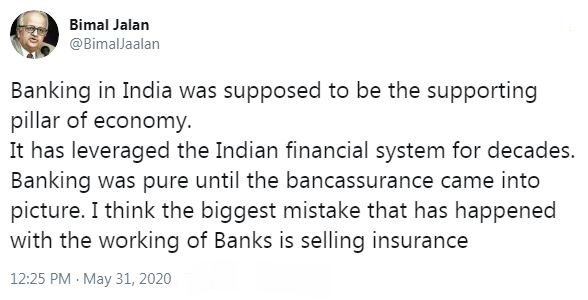Gopabandhu Mohapatra
Banking in India was supposed to be the supporting pillar of the economy. It has leveraged the Indian financial system for decades. Banking was pure until the bancassurance came into the picture. I think the biggest mistake that has happened with the working of Banks is selling insurance – Mr. Bimal Jalan, former Governor of RBI (1997-2003)

Pure Banking means carrying on activity of deposit, advance and remittances. But now a days, all commercial banks are undertaking many type of activities, specially selling of insurance and mutual fund products. In India, the law does not permit either banks or insurers to own an insurance company or bank wholly. Government of India Notification dated August 3, 2000, specified ‘Insurance’ as a permissible form of business that could be undertaken by banks under Section 6(1)(o) of the Banking Regulation Act, 1949. Then onwards, banks are allowed to enter the insurance business as per the guidelines and after obtaining prior approval of Reserve Bank of India.
Reserve Bank of India (RBI) has recognized “bancassurance” wherein banks are allowed to provide physical infrastructure within their select branch premises to insurance companies for selling their insurance products to the banks’ customers with adequate disclosure and transparency, and in turn earn referral fees on the basis of premium collected. This would utilize the resources in the banking sector in a more profitable manner.

Banks were initially not comfortable with the idea of selling insurance. They believed they should only manage money. The possible fee based revenue creation by banks in India from bancassurance is the temptation for banks to get involved in the process. The banks have a customer base of more than 100 million and therefore are in a perfect situation for taking bancassurance forward.
The proposal to allow banks to act as brokers provides a lot of opportunity to insurance companies to increase the reach of their products to a wider customer base and less penetrated areas of the country. Banks earn additional revenue by selling insurance products, and insurance companies expand their customer bases without increasing their sales force or paying agent and broker commissions.
Bancassurance arrangement benefits both. On one hand, the bank earns fee amount (non interest income) from the insurance company apart from the interest income, whereas on the other hand, the insurance firm increases its market reach and customers. The bank acts as an intermediary, helping insurance firms reach their target customers in order to increase market share.

Banks in India have all the right ingredients to make bancassurance a success story. They have large branch network, huge customer base, enjoy customer confidence and have experience in selling non-banking products. Both banks and insurance companies perceive bancassurance as an opportunity to increase the Indian financial industry’s future income and footprint. Non life insurance products are featured to a lesser extent as compared to life insurance products.
In India there are two categories of insurers, with distribution of life insurance products. First, companies promoted by banks such as SBI Life Insurance, ICICI Prudential Life, IndiaFirst Life, HDFC Standard Life, etc. The other category is companies having only bancassurance tie-up with banks such as Aviva Life, Bajaj Allianz Life, Max Life, Exide Life etc. Bank-promoted companies work through bancassurance channel as their major distribution channel.
This method aims at blending of insurance products as a ‘value addition’ while promoting the bank’s own products. Thus, banks could sell the insurance products without any additional efforts. In most times, giving insurance cover at a nominal premium/ fee or sometimes without explicit premium does act as an added attraction to sell the bank’s own products, e.g., credit card, housing loans, education loans, etc.

Many banks in India, in recent years, has been aggressively marketing credit and debit card business, whereas the cardholders get the ‘insurance cover’ for a nominal fee or (implicitly included in the annual fee) free from explicit charges/ premium. Similarly, the home loans / vehicle loans, etc., have also been packaged with the liability insurance cover as an additional protection. Having an insurance cover helps to meet the financial liability. Alternatively, a term insurance plan, which is a pure risk cover plan, suits the most to the borrower, as they are low-cost, high-cover plan with no maturity value.
According to the calculations, the 80.04 % indicates that the variance of the insurance sold through the bank distribution channel is explained by the variance of the credits granted. However, necessary safeguards need to be put in place given the likely mis-selling issues raised by stakeholders in a broker model. Banks have, in the past, been accused of mis-selling insurance products. Safeguards and standards needs to be put in place internally by banks and insurance companies, as well as the regulator to minimise mis-selling in both as corporate agent and broker model for banks.

The Insurance Regulatory and Development Authority of India is cracking the whip on mis-selling of insurance by banks. It proposed to ban insurance companies from giving incentives and parties to bank staff for selling insurance policies.
The government has asked PSBs not to pay commissions to employees for cross-selling products, and collect the funds as incomes for the banks themselves. This could dissuade PSB employees from cross-selling products, such as insurance or mutual funds, as banks will stop paying cash incentives, rewards and recognition for meeting targets on third-party sales.
Maximum complaints in life insurance related to mis-selling, mainly pertaining to private sector, although state-owned LIC leads the business with over 70% share. Complaints were mainly in the nature of unfair trade practices and mis-selling of products (e.g. malpractices, actual product sold being different from what was proposed, single premium policy being issued as annual premium policy, surrender value being different from projected, free look refund not paid, misappropriation of premiums).

Customers were sold policies they never understood or wanted. There were cases of blatant cheating. Life insurance policies were sold as fixed deposits. If you want to open a Savings Bank account, you must open insurance linked one. In this list of coercive selling, the latest entry is, if you want a loan, buy insurance, want a locker, take a policy, etc. Staff sometimes even mis-sell such products to gullible customers including account holders under the Pradhan Mantri Jan Dhan Yojana (PMJDY).
Because of undue pressure on employees to achieve targets at the cost of their core banking business, they insurance companies even offer incentives to employees through prepaid “achiever” cards, which work like debit card. Cross-selling targets have been given to bank executives at the top level, and to achieve the targets, the insurance companies also offer trips to exotic foreign destinations.
Hence, the question arises, whether banks should act as a broker for a petty income from commission. The faith remains the supreme and the Bankers should not dilute the goodwill of its vast customer base. Allowing Banks to sell insurance would erode the crumbling credibility of Indian banking. Instead of cross selling of insurance and mutual fund products by employees, let them focus be on lending and recovery of loans, which is of utmost importance and may adversely affect the health of the Banking Industry.
(Author is a former banker. Views expressed are personal)





























Very informative article.Banks have a large network due to their huge client base and insurance companies want to leverage that.Insurance companies pays commission to banks on every deals that’s why banks also earn money but yes more focus should be on lending and recovery of loans as said in this article.
A very nice analysis of negativity of insurance business in banks. Sometimes the fee based in come earned by banks is being neutralised by loss of bank business. Bank deposits are diverted for insurance business. Introduction of insurance business in banks is more beneficial for the insurance company than the banks.Insurance companies multiply their business manifold with the infrastructure of banks and with bank staff.on the other hand with no additional manpower bankers loose their business.
In case of public sector banks in india insurance business should be done in a subsidiary of the bank
And not in a simultaneous way.
?